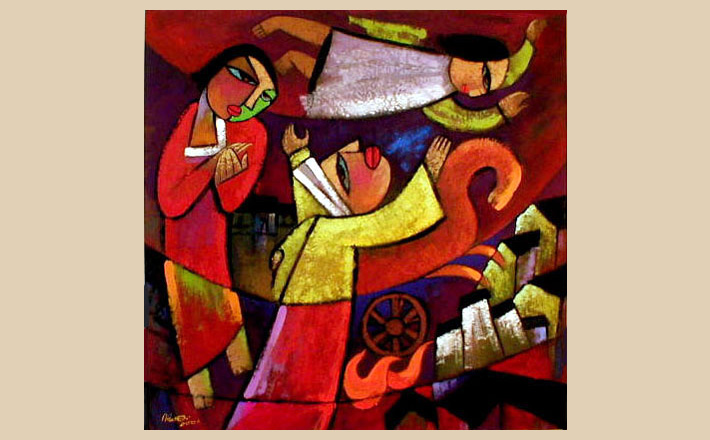Commentary on 1 Kings 19:15-16, 19-21
The call of Elisha is not like other prophetic call narratives in the Old Testament.
This story lacks the dramatic visions of Ezekiel, the cherubim and seraphim of Isaiah, the burning bush of Moses, or even Jeremiah’s reassuring word from God. In fact, Elisha’s call does not involve any direct encounter with God at all. Instead, it is the prophet Elijah who initiates Elisha’s change in vocation.
The first stage of Elisha’s new call is to be a follower and servant — a disciple, as it were — of this holy man. Elisha will later be described as the man “who used to pour water on the hands of Elijah” (2 Kings 3:11). The LORD tells Elijah to anoint Elisha as prophet in his place (1 Kings 19:16), language usually reserved for kings or priests, and such an apprenticeship with the prophet likely implied succession.
Nevertheless, this scene at 1 Kings 19:19-21 ends with Elisha ministering to Elijah (vayshartehu), not prophesying with him. The same verb is used in Genesis, for example, to describe Joseph’s relationship to Pharaoh (Genesis 39:4). Later, after Elijah is taken up into heaven, Elisha will begin to exhibit prophetic powers, but when Elijah first calls Elisha, he calls him to discipleship. It is thus understandable if Elisha’s call brings to mind New Testament accounts of the calls of Jesus’ disciples more readily than the call narratives of the Old Testament prophets.
The moment of Elisha’s “anointing” happens not with a pouring of oil, but rather with the throwing of Elijah’s cloak. The precise cultural resonances of Elijah’s mantle-toss are lost to us today. It is unclear whether this was a recognized symbol of apprenticeship, a common custom among prophets, or a gesture unique to Elijah himself. In any case, Elisha seems to understand the significance of the move.
Moreover, Elijah’s mantle will continue to provide a powerful symbol of prophetic vocation and prophetic succession throughout the Elijah-Elisha narratives. When Elijah is later taken up to heaven in a chariot of fire (2 Kings 2:1-14), Elisha picks up Elijah’s fallen mantle, invokes the name of the LORD, and is able to perform the same miracle with the mantle that Elijah had previously. Thus, Elijah’s draping of his mantle over Elisha foreshadows the exchange of the mantle yet to come.
When Elisha slaughters the oxen that had previously provided his livelihood, he makes a powerful statement of vocational commitment. There is no going back to his former way of life. Elisha must be prompted to make this move, cued by Elijah: “Go back, for what have I done to you?” This statement may be a rhetorical rebuke, but it may also be a question for which Elisha, at least for himself, must provide a real answer. What claim does this call make on his life? What ties must he leave behind?
Though Elisha will not perform any prophetic miracles before Elijah is taken up to heaven, his actions with the oxen show that he is indeed more than a servant. He is a prophet-in-training. Elijah has been associated consistently throughout the Kings narrative with water and food, particularly in times of drought and famine brought on by the apostasies of kings. He has made plenty out of the widow of Zarephath’s scarcity (1 Kings 17:8-16), he has been fed by ravens (1 Kings 17:6), and the angel of the LORD has brought him bread and water in the wilderness (1 Kings 19:6). Elisha, too, will cleanse fetid waters (2 Kings 2:19-22) and fill a widow’s empty jars with oil (2 Kings 4:1-7). By slaughtering his oxen and feeding the people with them, Elisha establishes himself, like Elijah, as a source of God’s great abundance.
Elisha’s call narrative will rightly prompt many sermons about vocation and discipleship. How do we recognize God’s call in our lives? What signs of our talents and gifts have we seen in the past, and what must we give up to embrace the future God is making for us? How have we seen God’s work manifested in mentors, friends, or strangers? Have we apprenticed ourselves to scarcity and fear or to abundance and hope?
Though Elisha may not know anything about Elijah’s dark night of the soul (1 Kings 19:4) in the earlier part of this chapter, we readers have been given a glimpse of the prophet’s gloom. We know that the prophetic call can be full of danger, loneliness, and despair. The prophet stands against the most powerful men in the land — the kings — and opposes their status quo. Elisha’s eagerness to follow Elijah may thus seem a bit naïve. Here the resonances with New Testament visions of discipleship become insuppressible for the Christian reader.
All four Gospel accounts describe Jesus addressing the soon-to-be disciples with the call, “Follow me.” With no hesitation, they put down their old work and take up this new vocation. It can seem absurd in its abruptness. Where is the risk assessment? Where is the accounting of their savings or their retirement portfolios? Why aren’t they holding out for 2.5 children and a house on a cul-de-sac instead?
A commitment to discipleship requires an about-face, a total turn away from the world’s values and toward God’s. The Bible witnesses to the nature of this call again and again, be it in the story of Moses and the burning bush, of Elisha under Elijah’s mantle, or of the disciples’ setting down their nets. I am reminded of the hymn “I have decided to follow Jesus,” which sums up this commitment to discipleship in starkly poignant terms: “The world behind me, the cross before me, no turning back, no turning back.”


June 30, 2013